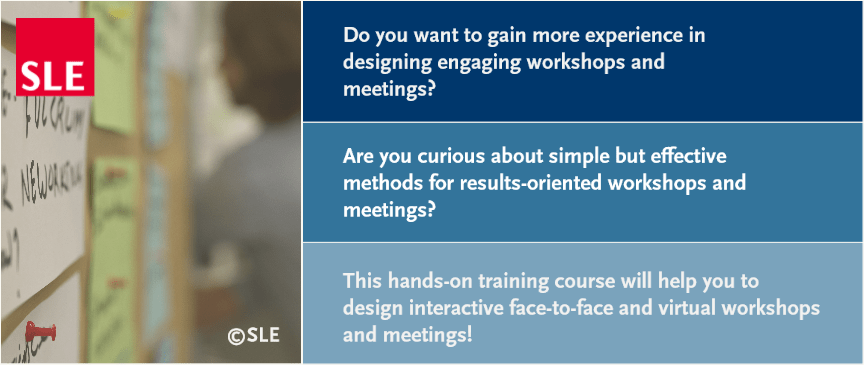
ONLINE COURSE: Participatory Methods for Workshops and Meetings
People often come together to discuss, plan, evaluate, solve problems, take decisions or share experiences in a workshop. Investing time and thought in the design and preparation of workshops or meetings increases their effectiveness and is essential to reach tangible outcomes. This course is very hands-on in character and will emphasize on how to plan and design participatory workshops and meetings with simple but effective tools and techniques.
We will introduce participatory methods and tools for face-to-face as well as remote workshops and meetings and thereby create our “toolbox”, reflecting on how to use and adapt these methods according to different objectives, contexts and phases. Even though the focus lies on the planning and methodological design of workshops, we will also cover facilitation aspects – especially in the context of virtual meetings.
Course Objectives
By the end of the course participants
- have a better understanding of how to plan and design interactive workshops of different lengths, settings and purposes;
- are provided with a variety of methods for the beginning, central and final phase of workshops;
- have reflected on different workshop approaches, as well as on facilitators’ roles, attitudes and skills to support participatory working processes.
Course Content
- Responsibilities, skills and attitudes of workshop facilitators
- Planning and preparing workshops and meetings
- Workshop design for all phases from beginning to closure
- Toolbox: methods, tools and techniques for different phases, including icebreakers and energizers
- Handling difficult situations
- Additional or adapted tools and tips for virtual meetings and workshops
Course Programme
The preliminary time frame of the sessions is as follows:
9.30 a.m. — 3.00 p.m. CEST (Central European Summer Time).
What does live online training mean?
Our online trainings are not pre-recorded training videos, webinars for large audiences or self-paced e‑learning courses. They are virtual live trainings delivered by our trainers in real-time, focusing on the interaction of a small group of remote participants. Just like our face-to-face trainings, these virtual classrooms aim at tailoring the discussions and learning experiences to the training needs of the participants.
Requirements: to attend our live online trainings, a reliable high-speed internet connection and a computer or laptop running Windows or iOS are required (including audio and video). The Humboldt-Universität of Berlin uses the videoconferencing platform Zoom for virtual classrooms as well as digital tools such as Moodle. We strongly recommend an external headset for better sound quality.
Course Methods
The course focuses on what happens before, during and after workshops. It is a practice-based training course where learning by doing is combined with essential theoretical background and opportunity to exchange individual experiences and knowledge with other peers. Participants are encouraged to bring their own (impending) workshop cases to work on during the course.
The virtual classroom sessions with the trainers and the fellow participants via Zoom will be complemented by group exercises, assignments as well as time for self-study and reflection.
Target Group
This introductory course is designed for those with little or no experience in the design and facilitation of workshops. However, more experienced facilitators might refresh ideas and get new inspiration for their face-to-face as well as virtual workshops and meetings.
General information
The tuition fee is 750,- euros per participant.
This includes:
- 4‑day online training course
- Course documentation and learning materials
- Certificate of participation issued by Humboldt-Universität zu Berlin
- Ansprechpartner: SLE Training
- E-Mail: sletraining@hu-berlin.de
- Online-Anmeldung (URL): https://www.sle-berlin.de/index.php/en/training/sle-training-courses/apply-now



